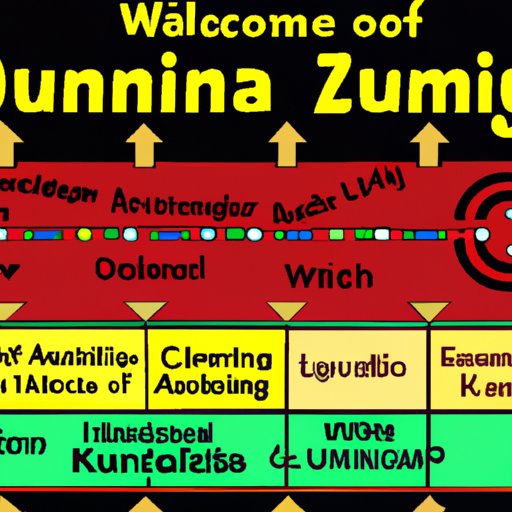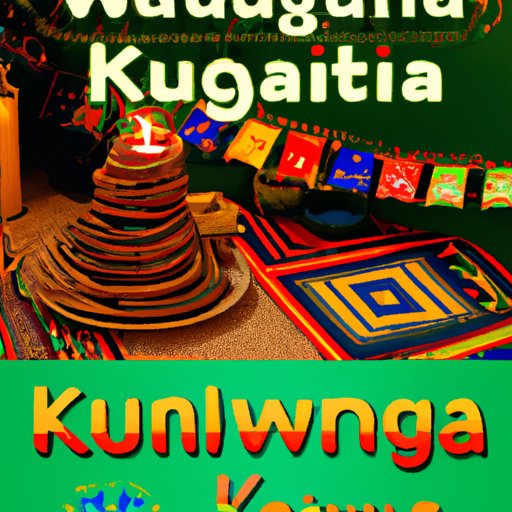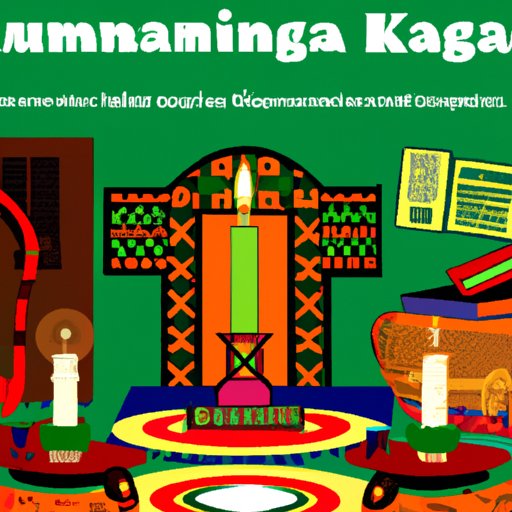Introduction
Kwanzaa is an African-American holiday that celebrates family, community, and culture. It was created in 1966 by Dr. Maulana Karenga, a professor of Africana Studies at California State University, Long Beach. This article will explore the history and meaning behind Kwanzaa, from its origins to its global celebration today.

Interview with Creator of Kwanzaa
In an interview with The New York Times, Dr. Maulana Karenga shared his experience of creating Kwanzaa. He said, “I wanted to create something that would give Blacks an alternative to the existing holiday and give Blacks an opportunity to celebrate themselves and their history, rather than simply imitate the practice of the dominant society.”
Karenga explained that he drew inspiration for Kwanzaa from various African cultures and traditions. He aimed to create a holiday that was rooted in African values, such as unity, self-determination, collective work and responsibility, cooperative economics, purpose, creativity, and faith. He also wanted to provide an alternative to Christmas and other Western holidays, which he felt did not reflect the values and experiences of African Americans.

Timeline of Development of Kwanzaa
To understand Kwanzaa’s development, it is important to look at the sociopolitical context of the 1960s and 1970s. During this period, African Americans were fighting for civil rights and racial equality. This struggle led to the emergence of the Black Power movement, which sought to empower African Americans through political, economic, and cultural self-determination. Kwanzaa was created as part of this movement.
In the 1980s and 1990s, Kwanzaa gained popularity and began to be widely celebrated. Major cities across the United States held Kwanzaa celebrations, and the holiday was featured in books, television shows, and films. By the 2000s, Kwanzaa had become a global phenomenon, celebrated in countries around the world, including the United States, Canada, Africa, and the Caribbean.
Biography of Inventor of Kwanzaa
Maulana Karenga was born Ronald McKinley Everett in Parsonsburg, Maryland in 1941. He grew up in a working-class family and attended Los Angeles City College, where he studied philosophy and religion. He later earned a master’s degree in political science from the University of California, Los Angeles.
Karenga was an influential figure in the Black Power movement. He founded the Organization Us, a black nationalist organization that promoted African-American cultural pride. He also wrote extensively on African-American culture and politics. His works include The Quotable Karenga, Introduction to Black Studies, and Kawaida Theory: An African Communitarian Philosophy.
Karenga’s influence on Kwanzaa can be seen in its symbols, principles, and values. He drew on his experiences and beliefs to create a holiday that celebrated African-American culture and heritage.
Origins of Kwanzaa and Its Meaning
Kwanzaa is based on the African concept of Pan-Africanism, which seeks to unite people of African descent throughout the world. According to Pan-Africanism, all Africans have a common history and culture that should be celebrated and honored.
Kwanzaa is also rooted in the Nguzo Saba, or Seven Principles, which are unity, self-determination, collective work and responsibility, cooperative economics, purpose, creativity, and faith. These principles guide Kwanzaa celebrations and serve as reminders of the importance of African-American culture and heritage.
Impact of Kwanzaa on African-American Culture
Kwanzaa has had a profound impact on African-American culture. It serves as a reminder of African heritage and provides an opportunity for African Americans to celebrate and honor their culture.
Kwanzaa also encourages African Americans to renew their commitment to African values. It promotes self-determination, collective work, and cooperative economics, which are essential to the survival and success of African-American communities. Finally, Kwanzaa encourages African Americans to build strong, supportive communities.
Exploring the Symbols of Kwanzaa
Kwanzaa is celebrated with several symbolic objects, including the Kinara (candleholder), Mkeka (mat), and Kikombe Cha Umoja (unity cup). The Kinara holds seven candles, each representing one of the Nguzo Saba. The Mkeka symbolizes tradition and history, while the Kikombe Cha Umoja serves as a reminder of unity and solidarity. Other symbols include the Mazao (crops), Zawadi (gifts), and Mishumaa Saba (seven candles).

How Kwanzaa is Celebrated Around the World
Kwanzaa is celebrated in many countries around the world. In the United States, Kwanzaa celebrations often involve feasts, gifts, music, and dancing. In Canada, Kwanzaa is celebrated with a parade and a marketplace. In Africa and the Caribbean, Kwanzaa is marked with traditional ceremonies and rituals.
Conclusion
Kwanzaa was created by Dr. Maulana Karenga in 1966 as an alternative to Christmas and other western holidays. It is based on Pan-Africanism and the Nguzo Saba, and is celebrated with symbols such as the Kinara, Mkeka, and Kikombe Cha Umoja. Kwanzaa has had a profound impact on African-American culture, providing an opportunity for African Americans to celebrate their heritage and build strong, supportive communities. Kwanzaa is now celebrated around the world, from the United States to Africa and the Caribbean.
Kwanzaa is an important symbol of African-American culture and heritage. It serves as a reminder of the power of unity and the strength of African-American communities. Through Kwanzaa, African Americans can celebrate their culture and honor their ancestors.
(Note: Is this article not meeting your expectations? Do you have knowledge or insights to share? Unlock new opportunities and expand your reach by joining our authors team. Click Registration to join us and share your expertise with our readers.)
